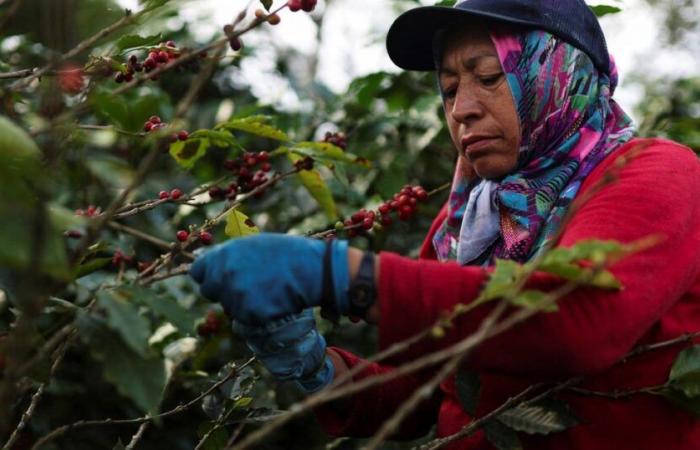DECRYPTION – Global warming is putting a strain on global coffee production, with demand outstripping supply for three years. Some actors also denounce excessive speculation.
On international markets and soon on supermarket shelves, coffee is becoming a luxury. The price of Arabica (70% of world production) soared to $3.20 per pound at the end of November in New York. This is twice as much as at the start of the year. Raw materials have never been so expensive since 1977! The grain has become so lucrative that coffee farms « become crime scenes »recently reported Bloomberg.
In Uganda, two farmers' associations say that thefts have reached unprecedented levels, to the point of installing watchtowers on plantations. In France, the price of a cup of coffee, consumed by 8 out of 10 French people, has already increased by ten cents at the counter, on average, since January 2024, according to the Federation of Master Restaurateurs.
Also read
In Panama, the secrets of the geisha, the most expensive coffee in the world
Several factors explain this inflation. Global warming is putting a strain on global production, with demand exceeding supply for three years now. Like cocoa, which shattered its record this year, trading at $12,000 per tonne in the spring, the climate has ravaged, in 2024, the harvests of the leading producer and exporter of coffee, Brazil. Extraordinary fires raged for several weeks this summer, from the Amazon in the north to the south of the country, fueled by a historic drought.
Concern about stocks
Despite recent rains, previous dry weather has caused « lasting damage »with below-average precipitation since April, explains Mirabaud analyst John Plassard. And this, during the crucial flowering phase. As a result, the outlook for the Brazilian harvest is gloomy. The USDA, the American Department of Agriculture, calculated that Brazilian coffee production in 2024-2025 would amount to 66.4 million, which is lower than previous forecasts which expected around 70 million tonnes. There is also concern about stocks: 1.2 million bags at the end of the season, in June, a drop of 26% compared to the previous one. Added to this are the problems of drought in Costa Rica and especially in Vietnam, which produces around 40% of robusta beans (used for instant coffee).
Fear of Trump's tariffs has exacerbated the situation
Baptiste Quidet, co-founder of the start-up Verto
In November, these supply tensions led to some panic among buyers. On the stock markets, the pool is very concentrated. We find large groups like Nestlé, which acquires grain en masse for its coffee brands and distributors. « Fear of Trump's tariffs has exacerbated the situation, argues this former Dreyfus trader, Baptiste Quidet, co-founder of the start-up Verto (marketplace for trading raw materials transparently). They rushed to cover their inventories and this rush on the physical market leads to escalating prices ». Until then, no more, no less, than the law of supply and demand. However, if fears about global volumes remain true, several players denounce excessive speculation on the part of investment funds.
High Frequency Trading
« We see that the impact of climatic hazards on world coffee harvests is less significant than expected and that with 160 million bags this year, production will more than cover needs, observes Jean-Pierre Blanc, general manager of Malongo cafés. There is therefore no shortage, but simply less overstock than usual. The volatility and current rise is due to funds speculating on global markets, often via high-frequency trading instruments. We are made to believe that it is climate change that is causing prices to soar. But above all it is a global economic system which trusts in the self-regulation of markets, an illusory self-regulation. »
High-frequency trading would worsen volatility because this system uses algorithms that chain react to the slightest change in price. In this specific case, a tension on real supply (problems in Brazil and Vietnam) probably triggered a series of frenzied purchases, amplifying the rise in prices. « There is a decorrelation between the consequences of poor harvests and the brutality of the price change »subscribes Nicolas Eberhart, coordinator of the team of agronomists at Scop Ethiquable. It's not new, it's cyclical : Coffee is considered to be the second most speculative market behind oil.»
European law on deforestation
Generally speaking, unlike cocoa where production is ultra-concentrated in West Africa, and where governments set a floor price before the start of the season, the explosion in coffee prices benefits producers more. It is when the fall in prices is brutal that this is more complicated. In 2021, the price surge lasted a year before falling suddenly, from $240 per bag to $150. This volatility accentuates speculation, supports Nicolas Eberhart. « If coffee is not profitable, farmers do not maintain the plots so there are fewer stocks and prices soar. ».
Also read
Why coffee prices are experiencing a historic spike
Another factor driving prices up is the European law on deforestation, which will come into force at the end of 2025. The text requires producers and exporters to prove that their products do not come from deforested areas after 2020. This new constraint arouses concerns among producers, particularly in Latin America, where a large part of coffee is grown in areas at risk of deforestation. Compliance requires significant investments in traceability tools which de facto increase production costs. More and more market speculators are integrating these fears into their strategy, anticipating a reduction in the supply of certified coffee for export to Europe.






